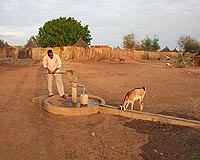| . |  |
. |
Lagos, Nigeria (UPI) Jun 22, 2009 Amid growing unrest around the oil-rich Gulf of Guinea in West Africa, Nigerian security authorities have seized a Ukrainian cargo aircraft loaded with 18 crates of weapons and ammunition bound for Equatorial Guinea, the third-largest oil producer in sub-Saharan Africa. The Antonov AN-12 transport was impounded with its seven crew members at Mallam Aminu international airport at Kano in northern Nigeria on June 17 when it landed to refuel on a flight from Zagreb, capital of Croatia, to Malabo, Equatorial Guinea's seaside capital. The case is in the hands of Nigeria's Directorate of Military Intelligence, indicating suspicions the weapons are related to political skullduggery in a region where most Africans live on $2 a day while their leaders appropriate their countries' oil wealth. Nigeria is the region's largest oil exporter and paramount military power. The arms were apparently destined for the military forces of Equatorial Guinea, a former Spanish colony whose longtime president, Teodoro Obiang, has been the target of at least two abortive coup plots in recent years. Obiang seized power in a 1979 military coup, overthrowing his uncle, Macias Nguema, who was later executed. Despite his dictatorial regime, Obiang is considered an ally by the United States because of his country's oil wealth. Attackers in two speedboats fought a gun battle with Obiang's troops on Feb. 17. The assailants' objective was not clear, but there was speculation they were trying to free Simon Mann, the British leader of a largely South African mercenary force that tried to overthrow Obiang in 2004. Mann is currently serving a 34-year sentence in Black Beach Prison in Malabo but was reportedly in a civilian hospital at the time of the February attack. The arms seizure in Kano occurred amid a wave of unrest across the entire Gulf of Guinea region, which U.S. officials say is expected to supply 20 percent to 25 percent of total U.S. oil imports by 2020. The region's energy riches are also important to China. Angola is China's main oil supplier, and Gabon is one of former colonial power France's primary providers, so any upheaval in the region could have serious economic consequences across the globe. But there is another important factor in the current wave of turbulence: narcotics. The former Portuguese colony of Guinea-Bissau on northwest Africa's Atlantic coast was plunged into a new cycle of political violence on March 1 when the armed forces commander, Gen. Batista Tagme Na Waie, was killed in a rocket-propelled grenade attack on his headquarters in the capital, Bissau. The following day, troops loyal to Na Waie assassinated the president, Joao Bernardo Vieira, in his palace. Military coups are commonplace in Africa, but this one was different. It was not connected to seizing political power in what is one of Africa's failed states, but to controlling the growing cocaine smuggling route from Latin America to Europe. Guinea-Bissau, the closest spot in Africa to South America, is the key trans-shipment point. Most of the country is made up of islands, and these ungoverned locales are ideal for cocaine smugglers, who cut in the country's power elite for a big piece of the action. On June 5, as the country prepared for a presidential election, two former ministers, both close associates of the slain president, were shot dead in their homes by military police who alleged they were plotting a coup. One, former Territorial Administration Minister Baciro Dabo, was the leading contender for the presidency. Reprisals by the Vieira faction are likely in the impoverished, foundering nation, although elections are still scheduled for June 30. In neighboring Guinea, another major narcotics conduit, the former chief of the armed forces, his son and 18 other people, including an Israeli, were arrested in June on drug-trafficking charges by the regime of President Moussa "Dadis" Camara, an army captain who seized power in a December 2008 coup. Camara declared he was cracking down on the narcotics trade, but critics allege he is simply taking over the drug business for himself.
Share This Article With Planet Earth
Related Links Africa News - Resources, Health, Food
 Developed countries hanging to aid commitments despite downturn: UN
Developed countries hanging to aid commitments despite downturn: UNAddis Ababa (AFP) June 19, 2009 Developed countries have maintained their aid commitments despite the global economic crisis, a top UN official said Friday, but warned that fluctuating exchange rates could impact on pledges. Africa's growth rate is expected to slow to a 20-year low of two percent in 2009, and many experts have warned of "catastrophic" effects if Western nations opt to reduce their aid packages as a result ... read more |
|
| The content herein, unless otherwise known to be public domain, are Copyright 1995-2009 - SpaceDaily. AFP and UPI Wire Stories are copyright Agence France-Presse and United Press International. ESA Portal Reports are copyright European Space Agency. All NASA sourced material is public domain. Additional copyrights may apply in whole or part to other bona fide parties. Advertising does not imply endorsement,agreement or approval of any opinions, statements or information provided by SpaceDaily on any Web page published or hosted by SpaceDaily. Privacy Statement |